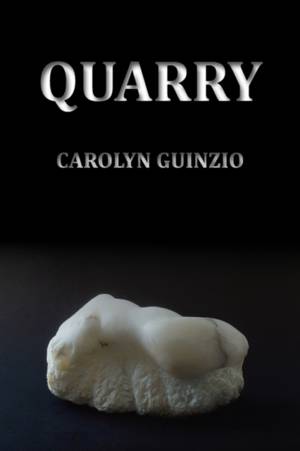
- Afhalen na 1 uur in een winkel met voorraad
- Gratis thuislevering in België vanaf € 30
- Ruim aanbod met 7 miljoen producten
- Afhalen na 1 uur in een winkel met voorraad
- Gratis thuislevering in België vanaf € 30
- Ruim aanbod met 7 miljoen producten
Zoeken
Omschrijving
Since at least the days of Horace, poets have found in nature, in the local flora and fauna, an invitation to observe, name, meditate and wonder. In QUARRY, Carolyn Guinzio's second collection, this tradition continues, in poems of tautly drawn, subtle eloquence. Her tone is somber, her pace gradual, as if, at any moment, something might happen to alter everything and toss the great endurance of life into ruin, or revelation: "A tremendous question hangs in the December sky." --Ann Lauterbach Good painters often talk of nameless colors. Brice Marden once told me he spent a month just mixing. The poems in QUARRY are full of strange, nameless mixtures of words. The work is descriptive, but it wants "not to know." The poems seem from one region, but the prose poems and the stanzaic ones have such opposed opaque architectures. One voice, but a voice decisive and skeptical. Nothing pastel, but full of dramatic holes punched out. This is a difficult idiolect, and it is a lesson in not accepting either a simple naturalism or bald abstraction. The poems seem to me to be truth-telling, emotional, and fragile with sudden storms within. To pursue the analogy: Her secondaries are as piercing as other poets' primaries. --David Shapiro Like that of Thomas Hardy's, this is poetry that is too true to the sopping reality of things to ever resort to self-romanticism or to settle for the clever phrase. Instead, Guinzio has arranged her carefully resonant poems as a single, extended crystallization of insight and inscape that is centered upon, even as it permeates, the natural world. . . . These are beautiful poems. Reading them, one begins to weigh what it means to live, with patience and inside language, on the face of this (still) living earth. --Tony Tost CAROLYN GUINZIO is the author of one previous collection of poems, WEST PULLMAN, winner of the 2004 Bordighera Poetry Prize. A Chicago native, she received a BA from Columbia College and an MFA from Bard College. Her work has appeared in BLACKBIRD, COLORADO REVIEW, DENVER QUARTERLY, 42 OPUS, INDIANA REVIEW, NEW AMERICAN WRITING, and many other journals. She has received awards from the arts councils of Kentucky and Illinois and now lives in Fayetteville, Arkansas.
Specificaties
Betrokkenen
- Auteur(s):
- Uitgeverij:
Inhoud
- Aantal bladzijden:
- 92
- Taal:
- Engels
- Reeks:
Eigenschappen
- Productcode (EAN):
- 9781602350854
- Verschijningsdatum:
- 29/09/2008
- Uitvoering:
- Paperback
- Formaat:
- Trade paperback (VS)
- Afmetingen:
- 152 mm x 229 mm
- Gewicht:
- 145 g

Alleen bij Standaard Boekhandel
+ 43 punten op je klantenkaart van Standaard Boekhandel
Beoordelingen
We publiceren alleen reviews die voldoen aan de voorwaarden voor reviews. Bekijk onze voorwaarden voor reviews.











